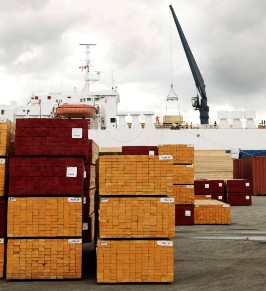 Log, lumber and other forest products shippers are stymied as 1,800 Canadian truckers - both union and non-union - escalate a strike at the Port of Vancouver, where forestry products make up as much as 80% of the volume.
Log, lumber and other forest products shippers are stymied as 1,800 Canadian truckers - both union and non-union - escalate a strike at the Port of Vancouver, where forestry products make up as much as 80% of the volume.
The Unifor-Vancouver Container Truckers Association, representing about 400 strikers, says truckers complain they are not compensated adequately for long waits to load and unload.
The strike, which also is impacting rail lines delivering to the port, is costing $885 million a day. For Canada, it is a national concern - but the Port of Vancouver is managed by local authorities. Nevertheless, Federal Transport Minister Lisa Raitt appointed a mediator and set out a negotiating plan to settle the strike - which analysts say could push forestry products shipments to Seattle.
Minister Raitt, British Columbia Minister of Transportation and Infrastructure Todd Stone, and Robin Silvester, CEO of Port Metro Vancouver, developed a 14-point action plan to return the port to normal operations, includes provisions to ensure truck drivers are paid fair compensation. The Port Metro Vancouver tweeted this fact sheet on the strike today.
“Truckers understand the impact of the work stoppage, and we’re eager to find a speedy resolution,” said Paul Johal, President of Unifor-Vancouver Container Truckers’ Association. “Container truck drivers deserve more than minimum wage for waiting time.”
After 18 months of negotiations, Unifor-VCTA says its members voted 100% to strike on March 1. They have been joined by non-union truckers as well, both groups raising concerns that long line-ups and wait times at the Port of Vancouver are costing truck drivers money and that rates agreed to in previous contract negotiations were not being honored.
“We’re prepared to negotiate around the clock to end this dispute,” said Gavin McGarrigle, Unifor’s BC Area Director. “We’ve been trying for eight years to resolve these issues, and a negotiated agreement is the only sustainable solution. After that length of time, the port’s ‘trust us’ approach simply isn’t enough for our members.”
Truckers are considering the 14-point plan now, which addresses industry instability and concerns about undercutting agreed rates, says the Silvester of the Port Metro Vancouver, by restructuring the port's truck licensing system. The Port Metro Vancouver says it would plan to implement reforms by June 15, 2014.
“I have asked Port Metro Vancouver to implement the agreed upon action plan. It is time to get the port working once again and we expect the trucking industry to do their part and immediately return to work," says Minister Lisa Raitt.






Have something to say? Share your thoughts with us in the comments below.